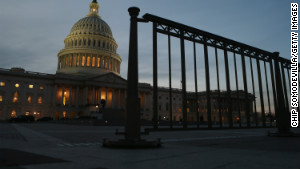Washington (CNN) -- With no deal in place in Congress, $85 billion in sweeping federal spending cuts will take effect Friday, targeting everything, from defense to education.
There is little hope of a last-minute deal to stave off the automatic cuts after the Senate failed to strike a deal and a large number of the members of the House left Washington on Thursday for the weekend.
The pending budget cuts are the result of impasse along primarily party lines, whose origins stem from an August 2011 deal to increase the debt ceiling.
Expectations are low that a meeting Friday morning between President Barack Obama and congressional leaders will yield a solution.
 The impact of forced budget cuts
The impact of forced budget cuts  Budget cuts ignites political circus
Budget cuts ignites political circus  Budget cuts: Warnings or scare tactics?
Budget cuts: Warnings or scare tactics?  Small thinking about BIG problems
Small thinking about BIG problems Most observers believe both sides will use the meeting at the White house to underline their positions heading into the next round of the budget wars -- a possible government shutdown on March 27, when current federal funding authority expires.
Under the law, Obama is required to sign an order sometime Friday that will force federal spending to shrink.
Why Washington can't cut wasteful spending
If that happens, Obama will formally notify government agencies that an obscure process known as sequestration is in effect.
It's unknown what immediate effect the cuts will have on Americans. Obama has warned it could devastate a fragile economy, while Republicans have challenged the dire warnings.
Leaving town
"I think the sequester is crazy, I think the president had to show more leadership, Congress should do more," said Rep. Peter King, a Republican heading back to New York. "But just to sit here by myself serves no purpose."
King was one of many congressmen who, before noon Thursday, walked down the Capitol steps and into awaiting cars to leave Washington. Democrats criticized Republicans for not sticking around when the cuts start coming; Republicans, in turn, blasted Democrats for not stepping up to do more to rein in spending.
There was plenty of blame to go around -- but not a lot of action.
The Republican-controlled House held one vote Thursday on the Violence Against Women Act. The chamber had no votes scheduled Friday. Neither did the Senate.
What you need to know about spending cuts
"I mean, we could stay here ... and not pass ... a bill," said Rep. Adam Smith, D-Washington, as he left the Capitol. "That's not any better."
Democratic, GOP alternatives
As expected, a sharply divided Senate voted Thursday afternoon to reject alternative plans put forward by Majority Leader Harry Reid, D-Nevada, and Minority Leader Mitch McConnell, R-Kentucky.
Reid had proposed replacing the current spending cut package with a $110 billion blueprint that included placing new taxes on millionaires while cutting agriculture subsidies and defense spending. Most Republicans object to new defense cuts and have called any new taxes unacceptable.
In the House, Speaker John Boehner referred to two GOP-authored bills the chamber passed last Congress on partisan lines to replace the now-imminent spending cuts.
Democrats dismissed the bills, which had no chance of clearing the Senate or surviving a presidential veto, as ideological showboating. Furthermore, the bills are null for the moment since they didn't pass the House as presently constituted.
But that didn't stop Boehner, an Ohio Republican, from trying to put the onus on the Democratic-led Senate.
"We've done our work," he said Thursday morning. Senators have "not done theirs. The House shouldn't have to pass a third bill to replace the (looming cuts) before the Senate passes one."
Read the Office of Personnel Management's furlough guide
{ 0 comments... read them below or add one }
Post a Comment